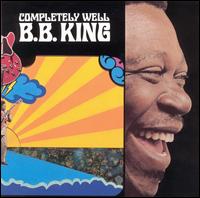| Completely Well | ||||
|---|---|---|---|---|
 | ||||
| Studio album by | ||||
| Released | December 5, 1969 [1] | |||
| Recorded | June 24–25, 1969 | |||
| Studio | Hit Factory, New York City | |||
| Genre | Blues, R&B, soul | |||
| Length | 49:57 | |||
| Label | BluesWay | |||
| Producer | Bill Szymczyk | |||
| B.B. King chronology | ||||
| ||||
Completely Well, released in 1969, is a studio album by the blues guitarist B. B. King. It is notable for the inclusion of "The Thrill Is Gone", which became a hit on both the R&B/soul and pop charts and which earned him a Grammy Award for Best Male R&B Vocal Performance in 1970. [1]
Contents
The album was released in the US as an LP record in 1969 and as a CD in 1987; in the UK only as an LP. San Francisco critic Ralph J. Gleason's liner notes are mostly a profile of King, with only a passing reference to the actual music contained in King`s commercial breakthrough album.